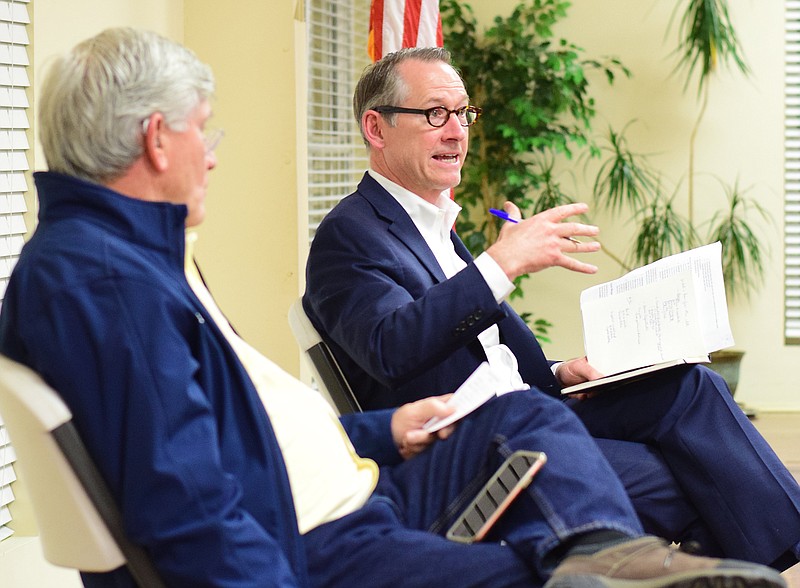NASHVILLE - Twitter, Facebook, Instagram, YouTube, Google and other online companies could find themselves regulated by Tennessee government under a Republican-backed bill in the state legislature that seeks to stop social media platforms from banning users based on their political content or slapping them with fines if they do.
Sponsored by Senate Finance Committee chair Bo Watson, R-Hixson, and Rep. Dennis Powers, R-Jacksboro, the legislation would treat social media firms as "common carriers" and subject both the companies and their practices to regulation by the Tennessee Public Utilities Commission, which sets rates and service standards for privately owned telephone, natural gas, electric and water utilities.
When presenting his Senate Bill 2161 last week in the Senate Commerce and Labor Committee, Watson said the structure of the bill stems from an opinion offered by U.S. Supreme Court Justice Clarence Thomas. That came in a 2021 Supreme Court ruling involving Donald Trump's effort, while president, to block critics from interacting with his Twitter account. The high court directed the lawsuit be dismissed since Trump was no longer in office.
But in an accompanying opinion, Thomas wrote that legislators would soon have "no choice" but to use the legal doctrine "common carriers" that allows for special regulation including a general requirement to serve all comers, Watson said.
"The justice makes the point that social media platforms are common carriers. And this bill will seek to regulate common carriers through the public utilities commission," Watson added.
While Thomas appeared to be referring to Congress, Texas and Florida legislators last year passed laws to regulate the companies as common carriers. Federal judges soon stepped in to block those laws from taking effect.
"I applaud your goal," Rep. Patsy Hazlewood, R-Signal Mountain, who once worked for AT&T, told Powers. "I'm concerned about the process. It's a little bit of a stretch in my mind to see the commonality between a common carrier and what we see here. Common carriers provide access, not content."
Replied Powers: "We're not censoring anyone's speech. This is actually about the First Amendment and free speech. That's what we're trying to provide."
"We believe it is constitutional," Powers added.
Rep. Eddie Mannis, R-Knoxville, said the firms are publicly traded companies but privately owned.
"As we've said several times before, we can't be telling private companies what they can do and can't do," Mannis said.
Citing Thomas' opinion, Powers disagreed.
In a Feb. 23 article posted on the Freedom Forum's website, First Amendment specialist Kevin Goldberg wrote that supporters compared tech companies to "common carriers" like phone companies or cable providers, which are barred from customer discrimination.
"Some states have attempted to prevent social media platforms from suspending, banning or otherwise punishing speakers who violate their broad terms of service. Bills introduced in Texas and Florida have been immediately - and successfully - challenged in court. Similar bills have been introduced in Georgia and Ohio."
He said the Texas and Florida legislation, as well as the bills in Georgia and Ohio, share some commonalities.
"These four bills have taken three paths to ensure compliance with the First Amendment. All four try to reclassify social media sites as 'common carriers,' Goldberg wrote. "Ohio and Georgia seek to designate social media as a 'public forum,' with Ohio also trying to attach 'public accommodation' statutes as well.
"It has been rejected by federal courts in Texas and Florida," Goldberg added. "In preventing enforcement of the Texas law, a federal judge explained that 'social media platforms are not mere conduits' for others' speech. Their screening, moderating and curating of users' speech differentiates them from internet providers and telephone companies."
During Tuesday's House hearing, Cameron Sholty, government affairs director with the conservative Heartland Institute think tank, spoke in favor of the legislation, House Bill 2639.
Sholty noted that 97% of social media traffic is routed through just a few platforms. Political speech can be "robust," he added.
"Increasingly, we find our online speech is indeed subject to capture, and that's not the way it's intended to be," Sholty warned.
Contact Andy Sher at asher@timesfreepress.com or 615-255-0550. Follow him on Twitter @AndySher1.
